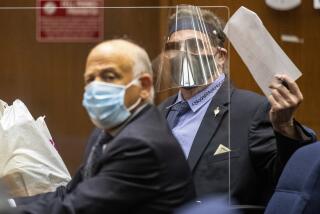Roger Egeberg; Health Official With County-USC, Nixon Administration
- Share via
Dr. Roger Egeberg, chief health officer in the Nixon administration and former dean of the USC School of Medicine and medical director of County-USC Medical Center, has died. He was 93.
Egeberg, in his later years a senior scholar at the National Academy of Sciences’ Institute of Medicine, died Friday of pneumonia at his home in Washington.
Salty and outspoken, Egeberg gained a reputation as the most colorful character in the upper echelons of the Nixon administration. He served as the assistant secretary for health and scientific affairs in the Department of Health, Education and Welfare from 1969 to 1971.
Egeberg openly criticized then-HEW Secretary Robert H. Finch for failing to take his advice on health matters and President Richard Nixon and his advisors for ignoring him and failing to appropriate proper amounts of money for health care.
Egeberg left his position after clashes over his managerial skills, and from 1971 to 1977 became the HEW secretary’s special assistant for health policy and the president’s special consultant for health affairs. He then worked for the Health Care Financing Administration, the agency that decides Medicare and Medicaid strategies.
In his 80s, working for the National Academy of Sciences, Egeberg championed geriatric training for doctors treating the elderly, and advocated a Medicare retainer fee to encourage those doctors to provide adequate time for older patients.
“For many older people who are not working any longer, a visit to the doctor’s office is the highlight of the week or month,” he told The Times in a 1984 interview. “The doctor must take that person’s life circumstances into consideration, and he must have access to a social worker who can help. But the trouble is, all that takes time--25 minutes at least--and for a lot of doctors, 25 minutes equals or surpasses their overhead.”
Although his federal government experience enhanced his national reputation, Egeberg was well-known for his more than half-century as a public health advocate.
After graduating from Cornell University and the Northwestern University School of Medicine, the Chicago-born doctor began his career as a medical educator at Western Reserve University in Cleveland.
Assigned to the South Pacific during World War II, Egeberg tired of mundane duties in safe Australian hospitals and won reassignment to front-line troops. There he fought for oil to eradicate mosquitoes that carried malaria, winning the attention of superior officers with a typical four-letter-word requisition. When his angry superior sent him to Gen. Douglas MacArthur for court-martial, MacArthur made him his personal physician, in charge of organizing emergency field hospitals.
Photographed with the general in his historic landing in the Philippines, Egeberg in 1993 published a book, “The General: MacArthur and the Man He Called ‘Doc.’ ”
Egeberg attained the rank of colonel and earned the Bronze Star and the Legion of Merit.
After the war, he served as chief of medicine at Wadsworth General Medical and Surgical Hospital in Los Angeles and taught medicine at UCLA. In 1959 he became head of County-USC Medical Center and in 1964 took the title of dean of USC School of Medicine.
Claremont attorney Stephen Zetterberg fondly remembered serving on a citizens committee on health care needs in California, which Egeberg headed in 1958. Zetterberg said he once sent a note to Egeberg asking why he used four-letter words in chairing a public meeting of a gubernatorial committee. Egeberg replied with his usual candor: “Because it wakes up the men and titillates the women.”
In addition to Western Reserve, UCLA and USC, Egeberg taught at Georgetown University and was a visiting professor at several institutions, including Claremont Graduate School.
He is survived by his wife of 68 years, the sculptor Margaret Egeberg; four children, Joan Hancock of Palo Alto; Sara McEre of Santa Barbara; Olaf of Washington, and Karen Warmer of Cambria, Calif.; eight grandchildren and four great-grandchildren.
More to Read
Sign up for Essential California
The most important California stories and recommendations in your inbox every morning.
You may occasionally receive promotional content from the Los Angeles Times.













